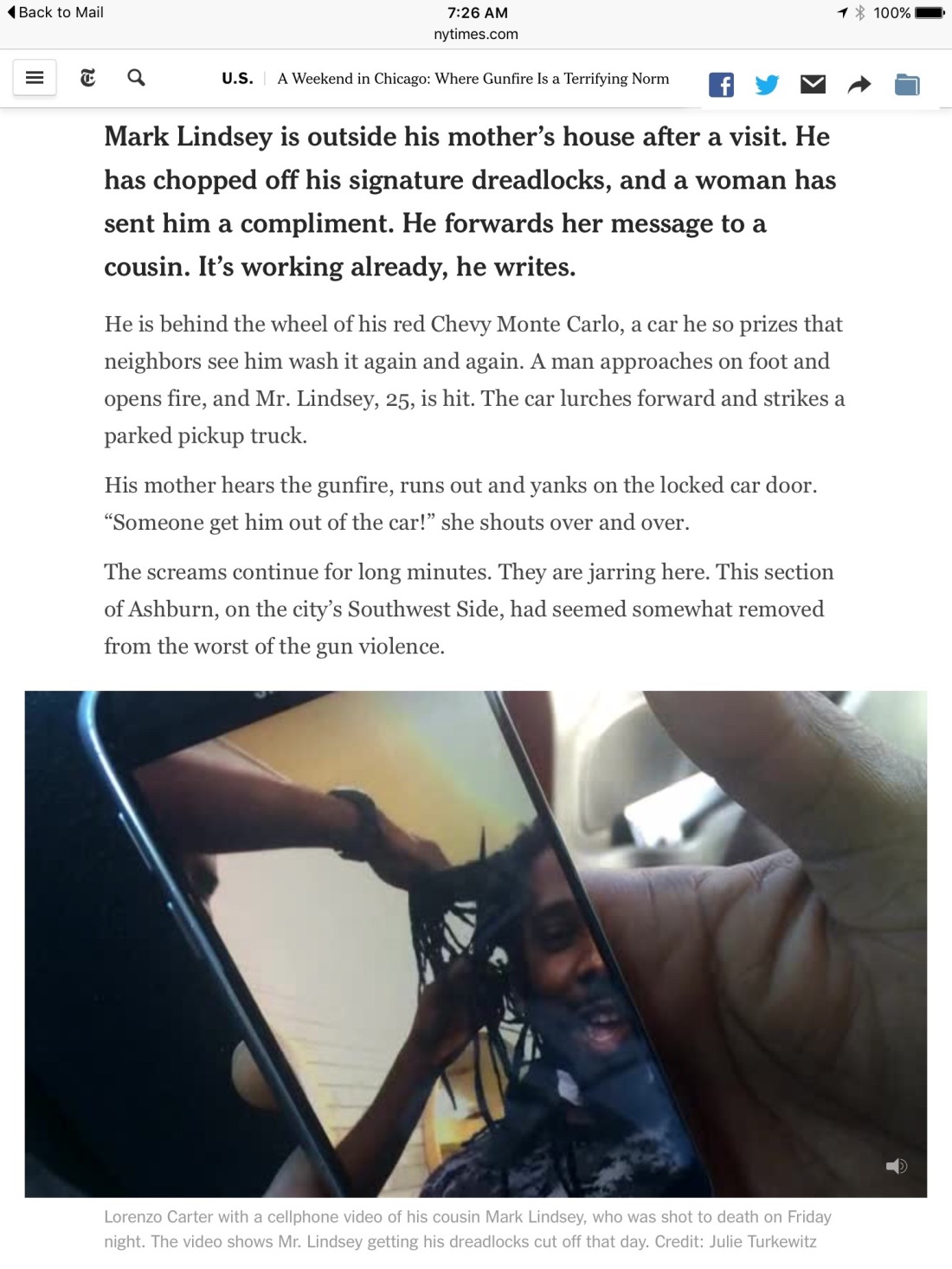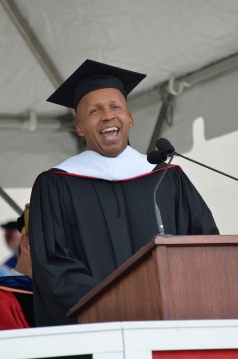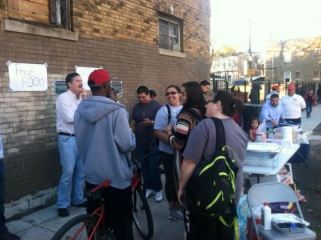Texts: 1 Kings 17:17-24 + Psalm 30 + Galatians 1:11-24 + Luke 7:11-17

“Mark Lindsey is outside his mother’s house after a visit. He has chopped off his signature dreadlocks, and a woman has sent him a compliment. He forwards her message to a cousin. It’s working already, he writes.
He is behind the wheel of his red Chevy Monte Carlo, a car he so prizes that neighbors see him wash it again and again. A man approaches on foot and opens fire, and Mr. Lindsey, 25, is hit. The car lurches forward and strikes a parked pickup truck.
His mother hears the gunfire, runs out and yanks on the locked car door. ‘Someone get him out of the car!’ she shouts over and over.
The screams continue for long minutes. They are jarring here. This section of Ashbury, on the city’s Southwest Side, had seemed somewhat removed from the worst of the gun violence.”
“A Weekend in Chicago: Where Gunfire is a Terrifying Norm”
New York Times, Saturday, June 4, 2016
What goes through our minds as we hear these stories over and over again in our city? I’ll tell you what goes through my mind. I think, “Ashbury, Southwest Side, not my neighborhood.” I think, “signature dreadlocks, not like me.” I think, “a man approached on foot and opened fire? What had this kid done to deserve this execution-style hit? Was he in a gang?” I think all of these thoughts in the matter of one or two seconds, without trying to think them, without wanting to think them. As soon as I think them, another part of my brain starts to deconstruct these thoughts, starts scolding me for the prejudices they reveal in me.
What goes through your mind may be very different than mine. You might be remembering something very similar happening not too far from here. You might be listening to the description of Mark Lindsey’s hair thinking, “he sounds like my brother.” You might be remembering close calls with violence on the street, a night you were lucky to have made it to the morning. You might be hearing that mother’s screams, as she tugs at the jammed car door, trying to get to the lifeless body of her child.
It’s gotten so bad in Chicago that the New York Times has assigned a team of reporters to cover homicides in our city for the next year. Think about that for a second. It’s gotten so bad in Chicago that New York is doing a year long piece of investigative journalism about what’s happening in our city; because, you know, when you think of the streets of New York you immediately think about how safe they are. Yet it’s often true that in order to see clearly what is happening around us, we need an outsider to come and observe with fresh eyes what’s going on, to name the thing that’s so obvious we’ve become blind to it.
When Jesus comes upon the scene of a woman, named as a widow, walking alongside the lifeless body of her only son as he is being carried out of the city, Luke’s gospel says, “When the Lord saw her, he had compassion for her and said to her…” (Luke 7:13) Even before we consider what Jesus said to this woman, let’s just stop to notice the three things Jesus does in response to this grieving woman:
- He saw her — meaning, he allowed her suffering to interrupt his life, and he truly saw what was happening in the world, right in front of him;
- He had compassion for her — meaning, he did not look for a way to distance himself from her suffering, to explain how her life was radically different from his life, even though it was. Even though as a man, his fortunes would be entirely different if it had been his only child that had died than this widowed woman’s would be; and
- He spoke to her — meaning, he did more than contemplate her suffering from a distance, he did more than shake his head in pity at the state of the world, he crossed the distance between himself and this woman, and he joined her in the moment of her deepest despair.

In his commencement address to the graduating class of 2016 at Wesleyan University in Middletown, Connecticut last month, Bryan Stevenson spoke to urgent need for the kind of active compassion we see in Jesus. Stevenson teaches law at New York University and is founder of the Equal Justice Initiative, challenging bias against the poor and minorities in the criminal justice system. Speaking to his hope for the future, and confidence that these young graduates could change the world, he said,
The first thing I believe you have to do is that you have to commit to getting proximate to the places in our nation, in our world, where there’s suffering and abuse and neglect. Many of you have been taught your whole lives that there are parts off the community where the schools don’t work very well; if there are sections of the community where there’s a lot of violence or abuse or despair or neglect, you should stay as far away from those parts of town as possible. Today, I want to urge you to do the opposite. I think you need to get closer to the parts of the communities where you live where there’s suffering and abuse and neglect. I want you to choose to get closer. We have people trying to solve problems from a distance, and their solutions don’t work, because until you get close, you don’t understand the nuances and the details of those problems. And I am persuaded that there is actually power in proximity. When you get close, you understand things you cannot understand from a distance … There is power in proximity.
He then goes on to recount how he himself is the “product of someone’s choice to get proximate.” How it was other people’s decisions to get close to him, to see him as he truly was, as he might become, rather than as a stereotype, that created the space he needed to grow into himself.
How are you the product of someone’s choice to get proximate, to get close to you? How has someone else’s willingness to look past the face you show the world, and to really see you, changed your life?
This is what Jesus shows us about the nature of God. That God, infinite in being and author of all that is, sees you. As small as you are. As invisible as you sometimes feel. God’s eye rests on you, sees you as you truly are, and loves you.
Last week we heard how the Centurion asked Jesus to heal his slave, but sent word that Jesus should not come into his home, because he understood that a religious Jew should not enter the home of a Gentile like him. But in today’s story Jesus goes further than entering the home of an unclean person, he touches the dead body of the grieving woman’s son, breaking the religious laws against coming into contact with the dead. In fact, it’s more than just the body of the dead son that Jesus should have stayed away from, but also anyone who’d come into contact with it, who would’ve been considered unclean for seven days. So, who was it that was very likely carrying this man’s body out of the city but the city’s own poor, who were hired to touch those unclean things that law-abiding folk could pay others to take care of.
These are the people Jesus sees, and has compassion for, and speaks to. These are the people Jesus allows to interrupt his affairs, to take precedence in his life. He steps forward, drawing his disciples with him, pulling them out of their comfort zones, to see and touch and talk to people and places left for dead. And as they do that, life returns.

In West Humboldt Park, not too far from here, Arielle Maldonado and Krystal Robledo have begun a project called “The Healing Corner” as their response to a shooting that took place right next to a prayer vigil. “Realizing prayer circles were no longer enough” these two women are organizing the neighborhood to take the streets, reclaiming street corners where violent events have occurred and transforming them into sites of healing and new life with food and music and free hugs for friends and strangers alike. They are trying to make it easier for all of us to stop and see the true faces of our neighbors, to hold that space open long enough for compassion and hope to flow back into our hearts, and to make it easier for us to speak to one another, to listen to one another, to reclaim our common humanity. Describing their intent, these two women write, “through encouragement, guidance, resources, and love, we hope to change lives and create peace in our most troubled inner-city communities.”
If it were only encouragement, guidance and resources, it might sound like so many other attempts to solve problems from a distance. Love, however, will not abide any distance between suffering and healing. Love comes close. Love looks and sees. Love touches and talks to. Love heals and lifts up. You know this is true, because over and over love has done this for you.
Today our Lord is walking toward another funeral bier, another wailing mother, another dead son, another suffering city. Today Jesus is inviting us to stop and look and then to follow.
Amen.